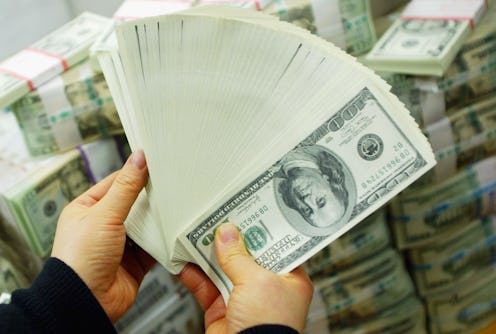News
Has Income Inequality In The U.S. Actually Risen?
Contrary to popular belief, income inequality has not risen since the U.S. financial crisis began in 2007. A new study by research professor Stephen J. Rose of George Washington University reveals that the drastic growth of income inequality during President Obama’s presidency might actually not be anything more than a “statistical gimmick.”
During Obama's time in the Oval Office, the chorus that the rich keep getting richer and the poor keep getting poorer continues to ring loud and clear. A Pew Research Center study reports that 61 percent of Americans think the country's economic system favors the wealthy. Only 35 percent think the system is fair. Naturally, this frustration over wealth inequality has boiled over into a critique of the president and his economic policies that many believe have fallen short.
Rose presents a different reality. In his analysis, Rose reports that the growth of the top 1 percent during the financial crisis is greatly exaggerated. The top percent’s incomes declined by 27 percent during the financial crisis, whereas the incomes of those in the bottom 95 percent saw their incomes drop by just 1 to 2 percent.
So how does that figure? Rose reports that the wealthiest Americans’ pretax incomes were actually reduced the most during the financial crisis. Granted, the wealthiest have also benefited the most from the recovery because they reaped the most benefits from the stock market's post-recession boom, but those benefits did not fully compensate their losses.
Further — contrary to perception — the federal government’s steps have in fact helped the bottom 95 percent. Because of tax cuts and increased benefits, both the middle and lower classes were protected and their losses were somewhat blunted, The New York Times reports.
But this seemingly positive news needs to be taken with a grain of salt. Even though income inequality might not have spiked drastically since the financial crisis, it’s still at historically high levels and it has been continually rising for the past three decades. A slight decline since 2007 doesn’t negate the fact that income inequality is still at its highest level in decades.
Moreover, when looking at this data, it’s important to note the difference between income inequality and wealth inequality. While income inequality looks at how much individuals earn, wealth inequality measures an individual’s total accumulation of money and other assets. According to Fortune, wealth inequality is 10 times as unequal as income inequality.
So why should we be concerned about income inequality? In short, it’s bad for society. While it can be argued that inequality is the simply the result of capitalism, drastic levels of inequality actually undercut business. When only a small percentage of the population has a large disposable income, businesses don’t have many opportunities for growth, Fortune reports.
But the problems with economic inequality extend further than just business. According to Fortune, historian Tony Judt said in his book Ill Fares the Land:
There has been a collapse in intergenerational mobility: in contrast to their parents and grandparents, children today in the UK as in the US have very little expectation of improving upon the condition into which they were born. The poor stay poor. Economic disadvantage for the overwhelming majority translates into ill health, missed educational opportunity, and—increasingly—the familiar symptoms of depression: alcoholism, obesity, gambling, and minor criminality.
With all of that information on the table, Rose’s report isn’t exactly reason for celebration. Because while it may be a relief to know that the problem of income inequality hasn’t gotten bigger, it’s still a very big problem indeed.
Images: Getty Images (2)
